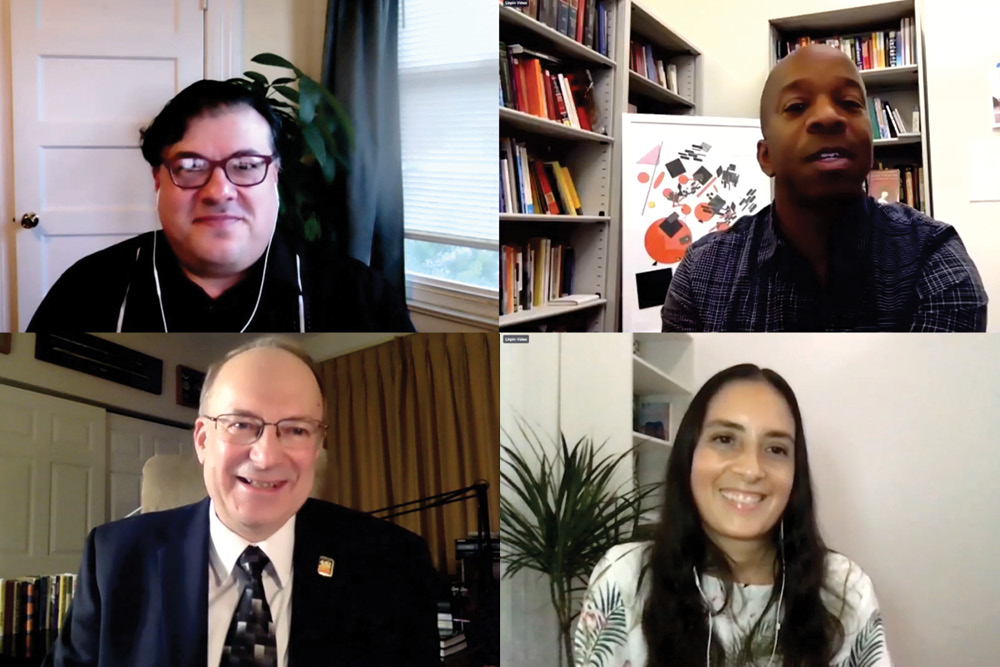
Panelists from "Are We Living in a World Ray Bradbury Tried to Prevent?" Composite shot taken from Youtube.
Happy 100th birthday, Ray Bradbury. But did you have to be so right about our world?
There were no candles and no cake on the YouTube or Twitter livestreams during a virtual Zócalo/Fowler Museum at UCLA event with ZYZZYVA, held to honor the late writer’s August 22, 1920 birth. But a lively panel of writers and scholars delved into Bradbury’s literary visions of the future, and the insights and warnings they still provide for humanity.
“Ray would often say he wasn’t trying to predict the future,” said Bradbury’s friend, actor and director Joe Mantegna, who introduced the event. “He was trying to prevent it.”
That insight framed the conversation, titled, “Are We Living in a World Ray Bradbury Tried to Prevent?,” which focused on a selection of his classic works: his breakout 1950 short story collection, The Martian Chronicles, his 1953 classic novel, Fahrenheit 451, and finally, “The Veldt,” a short story that became part of his 1951 anthology, Illustrated Man.
Panelist Lilliam Rivera, an award-winning author of young adult and middle-grade books, recalled the indelible images of Mars and the colonies she discovered in The Martian Chronicles as a child. But when she re-read the book as an adult, she was struck by a broader message about the dangers of colonization here on Earth—one that made her rethink her own story.
“I was thinking of Puerto Rico, where my family was from,” said Rivera, who also noted similarities in the “moral clarity” and broad questions of Bradbury’s work and the books of some of today’s Latinx writers of speculative fiction, including Fernanda Melchor and Silvia Moreno-Garcia. “Reading The Martian Chronicles once again brought back those ideas about imperialism,” Rivera added.
That prompted another panelist, Jonathan R. Eller, who directs the Center for Ray Bradbury Studies at Indiana University, to call the Mars of his friend Bradbury’s book “a mirror, not a crystal.”
“The question Ray Bradbury has in his mind from the very beginning is: With the memory of what we’ve done to this world, will we go to Mars and do the same thing?” Eller said.
“Ray was concerned [with] who we are going forward, when we’re living in an environment that is an illusion,” said Eller. Bradbury enjoyed technology, but was also suspicious of those who controlled it, in a way that rings true today.
“Ray Bradbury would ask the question implicitly, ‘Who watches the watchers?’” said Eller.
Those observations turned the conversation to the details of Fahrenheit 451. Oscar Villalon, the ZYZZYVA managing editor and moderator, noted that he had recently re-read the book for the first time since 1993.
“This time, it reads much less as speculative fiction,” Villalon said, noting the book depicts a society distracted by devices, where children kill for sport. “It’s also more brutal than I remember it … Nobody is really conscious of being alive in the book … It almost seems to be a meditation on all the ways that a democratic society declines into a spiritual collapse.”
That prompted another panelist, Michael Bennett, a professor at Arizona State University’s Center for Science and the Imagination, to marvel at how Bradbury created a book, read by millions in the 20th century, about how the destruction of books “marks the decline, the total implosion of civilization.”
Bradbury, Bennett noted, has been criticized for taking a child-like view of the world. “But the books are so rich and they have their fingers intensely pressed down on the pulse of so many things are important to society,” he said, “including efforts by baby authoritarians to clamp down our imaginations.”
As to the night’s title question—whether we’re living in a world Bradbury tried to prevent—Bennett said, “I’m solidly in the ‘yes’ camp.” He referred to the fact that the Zócalo event was taking place the same night that President Trump was giving his acceptance speech at the Republican National Convention.
Questions submitted by audience members in the YouTube chat room drew the panelists into a deeper discussion of Bradbury’s devotion to Los Angeles, where he spent most of his life. Having never gone to college, Bradbury educated himself in L.A.’s public libraries, Bennett noted, and even occasionally referred to himself as a librarian.
Audience members also asked about Bradbury’s views on everything from private space exploration to authoritarianism and media manipulation.
“With all the stories we’ve talked about this hour,” observed Rivera, near the evening’s end, “it’s like a checklist of what’s happening now.”




Send A Letter To the Editors